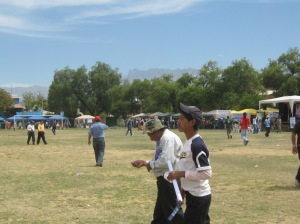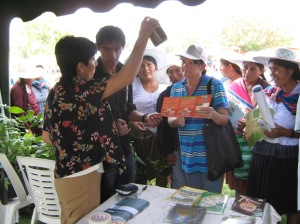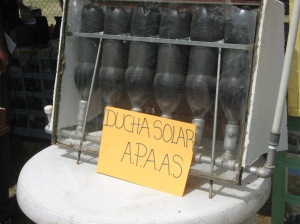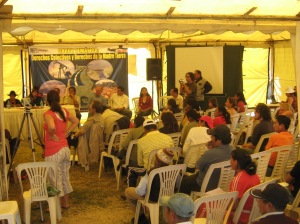The second main day of the Feria de Agua was held today. I went along not really sure what I’d find. The name Feria appears to cover a lot, there seems to be a Feria of something or other here every week.
As we arrived there were speakers on the main platform, mostly talking about the community strategies for getting the drinking water they need. This included raising money for wells, forming co-operatives and creating plans for the community for water use. All around the edge of the field there were stalls from all the different communities, many of them had made models of their communities. At the stall of ASEO, the ecological association of the East of Bolivia, I met Urbelinda Ferrufino. Her stall was demonstrating a community compost toilet system. She held up a jar of fine compost to the amazement of the assembled.
She explained to me that she saw these ecological projects as one of the only true solutions. “Many of these stalls say they are anti-neoliberal, but they are still buying into this model of having running water and sewage. It’s crazy!” She explained to me that there are blocks of flats and even hospitals in Mexico that have compost sewage systems.
The project she works with is also involved with tree planting, popular education and developing grey water systems. She invited us to visit the project and we talked about the possibility of linking up a small bit of funding from a seed swap in Bristol to a new seed swap project she wanted to start in the East of Bolivia. As I walked away she was beginning another round of explanations and giving out information to the assembled crowd. A few years ago I helped to edit a book with how to guides for gray water systems, solar showers and compost toilets. At this Feria it seemed like many of these projects were being demonstrated and linked up to the bigger issue of community control of resources and it was great to see things being scaled up to a larger scale level. See chapter from our book here:
http://trapese.clearerchannel.org/chapters/HandbookForChangingOurWorld_chap2.pdf
A little later in the day I went to the 18th Table of the conference, or themed tent, “Collective Rights and Rights of the Mother Earth.” The assembled people discussed regional projects of extraction of natural resources. This is autonomously formed and in addition to the 17 official working groups of the conference and has been set up specifically to bring local issues of pollution, extraction and environmental degradation into the public eye.
It highlighted the contradictions between the discourse of mother Earth Rights and the projects which continue to expand under the MAS government. There has been a battle between those proposing the 18th table, Bolivian National Council of Ayllus and Markas of Qullasuyu (CONAMAQ) and the government who insist that this conference is not for local issues.
From their press release;
“Copper mining in Corocoro, Bolivia. The water used in mining is dumped directly into the river, poisoning the land and river. With the construction of roads “rights” of Mother Earth are being violated in the Madidi
National Park in the northern of department of La Paz and Isiboro-Secure Park in tropical zone of Cochabamba. The people who live in these places will not be heard by Evo Morales.”
read more herehttp://achacachi.blogspot.com/2010/04/evo-will-not-hear-qulla-indigenous.html







No comments:
Post a Comment